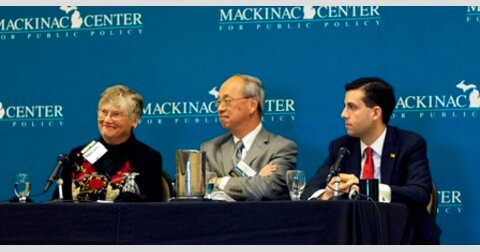Why Michigan Needs More Immigrants
Panel: Free market approaches to immigration reform
LANSING — In the most recent U.S. Census, Michigan was the only state to have a lower population and saw the largest economic decline in the nation compared with a decade earlier, but that can be solved with new immigration policies and work permits, a panel of experts said Tuesday.
The Issues & Ideas panel, "Free Market Approaches to Immigration Reform," was hosted by the Mackinac Center for Public Policy and featured Alex Nowrasteh, an immigration policy analyst at the Cato Institute; Bing Goei, a Grand Rapids businessman appointed by Gov. Rick Snyder to head the Michigan Office for New Americans; and Helen Krieble, founder and president of The Vernon K. Krieble Foundation.
All three agreed that more immigrants are needed in Michigan and across the nation and that elected officials need to make the issue a priority.
Krieble’s foundation created the "Red Card Solution," a plan that curbs illegal immigration by offering non-citizen work permits that do not lead to citizenship.
She based her ideas on America's founding principles: that all people are created equal; that limited government and free markets work best; and that businesses should be able to operate without endless interference from government.
"It bothers me that every time Congress talks about immigration it is about control by the government," Krieble said. "The government is centrally planning the entire foreign labor market and … central planning does not work out very well."
As an example, she pointed to the bureaucracy involved with adding foreign workers in high-need areas. It is expensive and time consuming because of government intervention. A market driven system that allows businesses to determine the need and fill it without government intrusion would solve many problems, she said.
The Red Card Solution is a guest worker program that is "not about immigration but about migration," she said. There would not be a centrally planned quota system and workers would not be given citizenship, allowing the economic laws of supply and demand to work. The only two requirements for a foreign worker to be hired would be proof of a self-supporting job and no criminal background.
Nowrasteh focused more on low-skilled immigrants.
"The only section of law more complicated than the income tax is the immigration system," he said.
There are currently 11 million to 12 million unauthorized immigrants in America, and about 42 percent of them entered the country lawfully, but overstayed. The reason they come, studies show, is that simply working in America gives them an average wage boost of 400 percent.
But if immigrants are not high skilled and get one of the few work permits that are given by the federal government, they have little chance of legally participating in the American dream. The current system harms them and the nation, he said.
"Immigrants are twice as entrepreneurial, which is remarkable considering how entrepreneurial Americans are," Nowrasteh said. "They are [also] twice as likely to create jobs."
Nowrasteh said that despite the fears of some people, studies show that the effect immigrants have on the wages of current residents is negligible. That's because immigrants tend to be complementary workers who are either very high skilled (creating jobs) or very low skilled (in positions Americans are not taking).
Nowrasteh said another myth is that immigrants cost America huge amounts of money because of social services. When you add in the amount they pay, the net fiscal situation is around zero, he said. Poor immigrants actually use much less welfare than poor natives. As an example, he said, if natives used Medicaid at the same rate as immigrants, the program would be 42 percent smaller.
Nowrasteh's proposed solution is to charge a tariff for a green card or work visa for people to come and to deny welfare programs to immigrants.
"Let's build a wall around the welfare state, not the country," Nowrasteh said.
"People are the most valuable resource," he said, adding that human capital is a nation's most valuable resource. "Free marketeers should support immigration reform that rolls back government involvement in the economy."
Goei said Gov. Snyder wants to focus on immigration because there are not enough native born students to fill the science, technology, engineering and math (STEM) jobs Michigan has and is projected to have in the future.
"We have 26,000 international students. Out of those, about 10,000 are in STEM degree work," Goei said. "Businesses cannot wait until Congress does something, so the state is doing what it can now."
Michigan is requesting 50,000 extra visas to repopulate Detroit, which Goei said would help boost the state's economy. The governor also is asking for Michigan to be designated as a regional center to give it more flexibility for the program.
Goei said that from 1995 to 2005, 33 percent of Michigan high-tech companies were started by immigrants.
Currently, high-skilled immigrants are coming to America and getting degrees or working here for a short time and then returning home. Goei said there is a 10-year waiting line even for high-skilled workers.
"That's a long time to wait for someone to come here, have to leave, and wait before contributing to our economy," Goei said.
~~~~~
A video replay of the event:
Michigan Capitol Confidential is the news source produced by the Mackinac Center for Public Policy. Michigan Capitol Confidential reports with a free-market news perspective.


 One-third of Michigan residents receive government assistance
One-third of Michigan residents receive government assistance
 Growth officer: Michigan a ‘leaky bucket’ for young people
Growth officer: Michigan a ‘leaky bucket’ for young people
 Senate bills would ban sanctuary cities in Michigan
Senate bills would ban sanctuary cities in Michigan